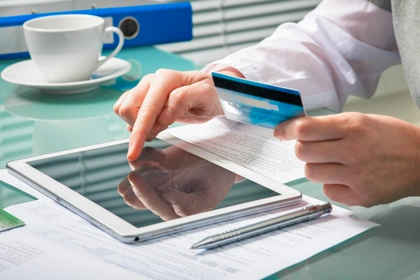Can a self-employed person apply for a credit card?
Yes, a self-employed person can apply for a credit card of any kind, be that a business credit card or a personal one. Lenders may see you as a higher risk if you don’t have a fixed income. However, they cannot discriminate against you just because you work for yourself.
Remember, each lender uses different criteria, and some may be more lenient than others. So, although there are no specific credit cards for those who are self-employed, there are credit card providers who are willing to lend to self-employed people.
How do I know if I’m eligible for a credit card?
While it’s true that there are different types of credit cards with different criteria, there are some factors that most lenders consider when you apply. These include:
- how steady your income is
- your credit history (which shows how well you’ve managed your money in the past)
- your affordability
Tip: It’s worth using an eligibility checker before you apply. This will show you if you’re likely to be accepted before you apply, without affecting your credit score. This will help you to avoid hurting your credit score by making multiple applications within a short space of time.
Decide whether you need a personal or business card
You’ll need to decide whether you need a personal or business card based on your individual financial circumstances and what you’re planning to use the card for. Business credit cards are specifically designed for business use, and personal credit cards are just for individual use.
If you are freelancing on a part-time basis alongside your regular job, or you’re just starting out, you may not need a business card yet. You could get a personal credit card instead if you don’t have a lot of business expenses to pay for, for example.
A small business credit card may be right for you if you struggle to separate your finances, want to make use of rewards, or make bookkeeping easier.
Benefits of a small business credit card
There are many benefits to getting a small business credit card, including:
- gain rewards – many business credit cards come with perks, including cashback, air miles, and travel insurance, for example
- build a business credit history – a business card can help to improve your business credit score - if you pay on time, every time
- get a higher credit limit – you may be able to borrow more with a business credit card, compared to a personal credit card. But remember to only borrow what you can afford to repay
- better cash flow – with a business credit card, you have money available for emergencies and short-term expenses
- separate your personal and business finances – having a card specifically for business use can help when it comes to bookkeeping and filing taxes
- add extra cardholders – employees can be added to your account (if needed)
Things to think about first
Make sure you consider these points before deciding whether to get a business credit card:
- annual fees and interest rates – annual fees are more common on business credit cards than personal credit cards and interest rates tend to be higher. You’ll need to decide if the rewards and benefits are worth the extra cost
- personal guarantees– if you run a small or new business, you may need to sign a personal guarantee, which is a legal promise to pay the balance out of your own pocket if the business cannot afford to do so. This means your business credit score can affect your personal credit score – positively or negatively, depending on how you manage the card
- pay at least the minimum amount – missed payments can damage your credit score and lead to late fees being applied
What will I need to apply for a credit card as a freelancer?
As a freelancer, when you apply for a credit card the lender will ask you to provide certain information about yourself, including (but not limited to):
- your name, address, and contact details
- residency status
- income and outgoings
- current bank balances
- savings
- outstanding debts
- your accountant’s name and contact details (if you have one)
In terms of documentation, you are likely to be asked to provide:
- proof of ID
- proof of address
- proof of income over the past two years (such as bank statements, tax returns and/or profit and loss statements)
The lender will also review your credit report to see how well you’ve managed your finances in the past. If you have a good payment history, they are likely to see you as a reliable and low-risk borrower, which should work to your advantage.
How to improve your chances of approval
To boost your chances of getting accepted for a business credit card, try to:
1. Build up your credit score
The higher your credit score is, the more likely you’ll get accepted for a credit card. A good credit score indicates that you manage money well and aren’t likely to exceed your credit limit or miss repayments.
You can start improving your credit score by following these six steps:
- pay your bills on time, every time
- register on the electoral roll
- fix any mistakes on your credit report
- remove old joint links from your credit report – especially if they have bad credit
- reduce your debt (to 30% or less of your credit limit on credit cards and overdrafts)
- avoid making multiple applications for credit within a short timeframe
2. Show stability
The more stable you come across in terms of your income and address, the less risky you’ll appear to lenders. Factors that may work in your favour include:
- living at the same address for more than three years
- appearing on the electoral roll
- always paying your bills on time
- using the same bank for a long time
3. Save up
If you have a pot of savings, that can also support your case, because having money to the side shows that you have another means to make your repayments if your income dips. It also shows that you are good at managing your finances.
Disclaimer: We make every effort to ensure content is correct when published. Information on this website doesn't constitute financial advice, and we aren't responsible for the content of any external sites.






